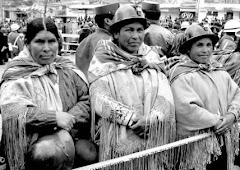 The next evening, D. and I held a small social gathering for the women leaders of each organization represented by the Coordinator. I spoke to them briefly about my project, and then played for them a 20-minute video that was being launched in Bolivia specifically for Women’s Day, entitled “The Construction of a Women’s Agenda in the Constitutional Process” (Bolivia is undergoing a difficult process to put a new constitution into effect). Finally, our guest of honor, a local female representative to the Constitutional Assembly, explained to us the main points of the proposed constitutional text and the changes that they represent for Bolivia.
The next evening, D. and I held a small social gathering for the women leaders of each organization represented by the Coordinator. I spoke to them briefly about my project, and then played for them a 20-minute video that was being launched in Bolivia specifically for Women’s Day, entitled “The Construction of a Women’s Agenda in the Constitutional Process” (Bolivia is undergoing a difficult process to put a new constitution into effect). Finally, our guest of honor, a local female representative to the Constitutional Assembly, explained to us the main points of the proposed constitutional text and the changes that they represent for Bolivia.The participants commented that they had not been able to grasp the meaning of the new constitution by reading it, and hearing it explained by someone who had participated in the drafting process made all the difference. At the end of the meeting, the leaders in attendance asked the Constitutional Assembly representative to present the Constitution to each of their organizations individually, so that their members could also benefit from such an explanation.
I should mention for those who are not familiar with recent events in Bolivia, that the process of drafting and putting a new constitution into effect has been fraught with difficulties since the commencement of the Constitutional Assembly in August of 2006. To sum it into a few words is nearly impossible, but I refer to an assessment by The Democracy Center’s Jim Schultz in a blog (www.democracyctr.org/blog/2008/03) that the conservative right’s opposition strategy has been to first make it impossible for the Assembly to do its job and then declare that the Assembly is useless because it isn’t doing its job.
In my view, democratic principles are giving way to a winner-take-all mentality on both sides of the highly-charged political divide, on the part of the government in order to redistribute political and economic power to benefit the poor majority and vindicate indigenous rights by means of a highly-controversial plan to reorganize the administration of the national territory on an ethnic basis, and on the part of the opposition to protect the upper class’ wealth and privileges, to retain control over enormous agricultural land holdings, and to regain control over Bolivia’s natural gas reserves and the bank accounts containing the money generated from the sale of gas to Brazil and Argentina.
Returning to the topic of this post, as a result of the interest shown in the new constitutional text by the leaders of local grassroots’ organizations, my next step will be to support them in their interpretation and analysis of the new constitutional text, especially referring to the proposed labor framework, so that they can take advantage of the May 1st International Worker’s Day observance to make their voices heard.









No comments:
Post a Comment